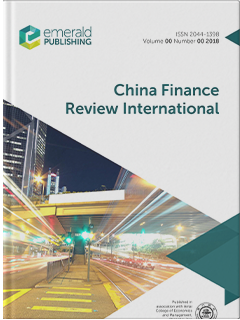日内动态市场均衡中潜在的一致行为
IF 7.6
1区 经济学
Q1 BUSINESS, FINANCE
引用次数: 5
摘要
本文运用量价概率波动微分方程提出了一种概念性理论,并对日内动态市场均衡价格进行了创新的行为解释,其中交易者的动量、反转和交互行为发挥了作用。设计/方法/方法作者选择日内累积交易量分布而不是价格作为显示偏好。均衡价格是相应的累计交易量达到最大值的价格。基于社会金融均衡的存在性,在不引入理性选择不变性标准的前提下,提出了一个可检验的互动交易者偏好假设。交互一致的偏好意味着选择服从于价格的交互不变性。作者发现,在动量交易者和反转交易者之间的拉锯战中,互动交易选择产生了恒定频率的价格和日内动态市场均衡。作者通过互动、动量和反转交易者来解释市场均衡。智能交互交易偏好是连贯的,并解释了局部动态市场均衡、整体动态市场不均衡和非线性非单调的v型卖出超过利润概率(BH曲线)。研究局限/启示未来,作者将通过更多的实证执行来理解投资者的行为和动态市场,提出一个统一的社会金融理论。实际意义作者可以将受试者的智能行为应用于人工智能、深度学习和金融技术。了解相互作用的个人或单位的行为将有助于超越金融市场边界的社会风险管理,例如组织治理、国家社会暴力和全球COVID-19大流行。原创性/价值揭示主体的智能交互交易行为。本文章由计算机程序翻译,如有差异,请以英文原文为准。
The underlying coherent behavior in intraday dynamic market equilibrium
PurposeThis paper applies a volume-price probability wave differential equation to propose a conceptual theory and has innovative behavioral interpretations of intraday dynamic market equilibrium price, in which traders' momentum, reversal and interactive behaviors play roles.Design/methodology/approachThe authors select intraday cumulative trading volume distribution over price as revealed preferences. An equilibrium price is a price at which the corresponding cumulative trading volume achieves the maximum value. Based on the existence of the equilibrium in social finance, the authors propose a testable interacting traders' preference hypothesis without imposing the invariance criterion of rational choices. Interactively coherent preferences signify the choices subject to interactive invariance over price.FindingsThe authors find that interactive trading choices generate a constant frequency over price and intraday dynamic market equilibrium in a tug-of-war between momentum and reversal traders. The authors explain the market equilibrium through interactive, momentum and reversal traders. The intelligent interactive trading preferences are coherent and account for local dynamic market equilibrium, holistic dynamic market disequilibrium and the nonlinear and non-monotone V-shaped probability of selling over profit (BH curves).Research limitations/implicationsThe authors will understand investors' behaviors and dynamic markets through more empirical execution in the future, suggesting a unified theory available in social finance.Practical implicationsThe authors can apply the subjects' intelligent behaviors to artificial intelligence (AI), deep learning and financial technology.Social implicationsUnderstanding the behavior of interacting individuals or units will help social risk management beyond the frontiers of the financial market, such as governance in an organization, social violence in a country and COVID-19 pandemics worldwide.Originality/valueIt uncovers subjects' intelligent interactively trading behaviors.
求助全文
通过发布文献求助,成功后即可免费获取论文全文。
去求助
来源期刊

China Finance Review International
BUSINESS, FINANCE-
CiteScore
12.40
自引率
1.20%
发文量
112
期刊介绍:
China Finance Review International publishes original and high-quality theoretical and empirical articles focusing on financial and economic issues arising from China's reform, opening-up, economic development, and system transformation. The journal serves as a platform for exchange between Chinese finance scholars and international financial economists, covering a wide range of topics including monetary policy, banking, international trade and finance, corporate finance, asset pricing, market microstructure, corporate governance, incentive studies, fiscal policy, public management, and state-owned enterprise reform.
 求助内容:
求助内容: 应助结果提醒方式:
应助结果提醒方式:


